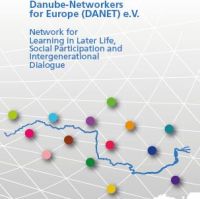 We want to introduce you to the topics of the “Danube-Networkers for Europe (DANET) e.V.” Newsletter: You will find two background articles, one concerning ICT and the other one concerning intergenerational learning. We present examples of good practice with reports about “The wanted Danube”, “Danube Networkers on the tour again” and the “Digital Danube mobility”. You will also find some hints concerning publications and interesting links, news and an event calendar. In particular please save the dates at the end of October for the participation day (28th of October 2015) and the general meetings of DANET and DCSF which also take place in frame of the 4th Annual Meeting of the EU Strategy for the Danube Region (EUSDR) in Ulm. Last but not least: We want to say goodbye to Mirjana Klapprodt who coordinated the DANET office since last year: thank you for everything!
We want to introduce you to the topics of the “Danube-Networkers for Europe (DANET) e.V.” Newsletter: You will find two background articles, one concerning ICT and the other one concerning intergenerational learning. We present examples of good practice with reports about “The wanted Danube”, “Danube Networkers on the tour again” and the “Digital Danube mobility”. You will also find some hints concerning publications and interesting links, news and an event calendar. In particular please save the dates at the end of October for the participation day (28th of October 2015) and the general meetings of DANET and DCSF which also take place in frame of the 4th Annual Meeting of the EU Strategy for the Danube Region (EUSDR) in Ulm. Last but not least: We want to say goodbye to Mirjana Klapprodt who coordinated the DANET office since last year: thank you for everything!
Newsletter 2 (July 2015)
2. Background Articles/Feature: ICT and older age
2.1 ICT in lifelong learning of elderly
BEST PRACTICES FOR IMPLEMENTATION OF ICT IN LIFELONG LEARNING OF ELDERLY
Assoc. Prof. Dr. Mariela Nankova, State University of Library Studies and Information Technologies (SULSIT), Sofia, Bulgaria
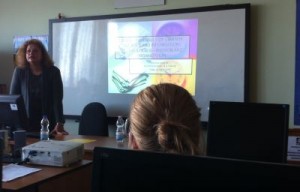 Here are some of my observations from practice:
Here are some of my observations from practice:
Using the services of a global network the teacher has the opportunity to turn the learning process into an attractive occupation for which are characteristic spontaneity of reactions, freedom of thought and creative response [1].
Very good tool to support adult learning, in certain situations, it is the computer. Multimedia training has the advantage of combining many different types of information and presenting it in the best shape (graphics, image, table, etc.) to ensure easy understanding of the material. The possibilities for the use of computer training are high. These multimedia may be presented on it [2]:
2.2. Understanding Community, Generations, Intergenerational Learning and Practices
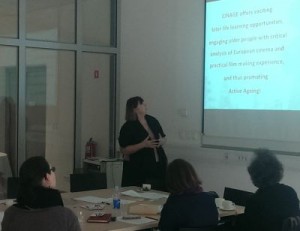 Dušana Findeisen, Slovenian Third Age Universit, Ljubljana, Slovenia
Dušana Findeisen, Slovenian Third Age Universit, Ljubljana, Slovenia
DANET focuses on education and learning in later life, social participation and intergenerational as well as cross cultural setting dialogue and co-operation. All areas are closely related to active ageing, learning and education in later life being an act of active ageing in their own right. Moreover, both learning in later life and intergenerational learning are ways towards changing individual life and fostering active ageing in intergenerational community.
3. Examples of good practice
3.1. “The wanted Danube” connects people
Danube- Networkers Day in Jamena / Serbia, and Vukovar / Croatia
Carmen Stadelhofer, DANET Chairwoman and Mirjana Klapprodt, DANET Project manager, Ulm, Germany
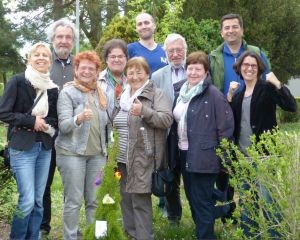 Jamena is a small Serbian village near the river Sava and the Bosnian and Croatian border. The proposal to organise a Danube-Networkers-Day in Jamena together with the primary School OŠ “Filip Višnjić” was created in the framework of a visit of the Danube-Networkers-Delegation from Ulm in October 2014 in Jamena. The whole village was hit by flood in March 2014. The guests from Ulm brought a donation of 3.000 Euro to the primary school to help them to refurnish some school classes and to buy new school materials . This support was possible through donations collected on the base of the woolen “Danube-pieces” made in frame of the project “The wanted Danube
Jamena is a small Serbian village near the river Sava and the Bosnian and Croatian border. The proposal to organise a Danube-Networkers-Day in Jamena together with the primary School OŠ “Filip Višnjić” was created in the framework of a visit of the Danube-Networkers-Delegation from Ulm in October 2014 in Jamena. The whole village was hit by flood in March 2014. The guests from Ulm brought a donation of 3.000 Euro to the primary school to help them to refurnish some school classes and to buy new school materials . This support was possible through donations collected on the base of the woolen “Danube-pieces” made in frame of the project “The wanted Danube
3.2. Danube Networkers are on the tour again
The DANET Day in Bulgaria – Ruse, Borisovo, Ryahovo, and Silistra
Emilia Velikova, Project coordinator of DANET Day in Ruse, Bulgaria
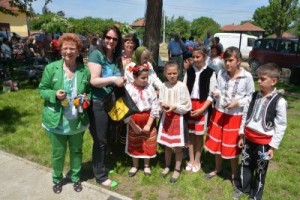 The European Association “Danube-Networkers for Europe (DANET) e.V., the University of Ruse and the Union of Pensioners‘2004-Ruse organized a Danube-Networkers Day on 15 May 2015, Friday. A number of events took place both in Ruse and in the villages of Borisovo and Ryahovo. The DANET delegation included Chairperson of DANET, Mrs. Carmen Stadelhofer, and three representatives of organizations, very involved by voluntary work in the project “The wanted Danube”, Bertram Wegemer, ILEU e.V., Stefani Meyer, a teacher in a high school in Illertissen (near Ulm) and Inga Engels from the “Donaubüro/Danube Office” of the towns Ulm/Neu-Ulm.
The European Association “Danube-Networkers for Europe (DANET) e.V., the University of Ruse and the Union of Pensioners‘2004-Ruse organized a Danube-Networkers Day on 15 May 2015, Friday. A number of events took place both in Ruse and in the villages of Borisovo and Ryahovo. The DANET delegation included Chairperson of DANET, Mrs. Carmen Stadelhofer, and three representatives of organizations, very involved by voluntary work in the project “The wanted Danube”, Bertram Wegemer, ILEU e.V., Stefani Meyer, a teacher in a high school in Illertissen (near Ulm) and Inga Engels from the “Donaubüro/Danube Office” of the towns Ulm/Neu-Ulm.
3.3 “Digital Danube” – Learning Mobility across Croatia, Germany, Bulgaria and Slovenia
Introduction Digital Danube
The Digital Danube is an Erasmus+ project (KA1 – Learning Mobility of Individuals) with participation of Public Open University Zagreb, Slovenian Third Age University, ZAWiW from Ulm University and SULSIT from Sofia. Main activities were short courses from January to April in 2015 in Zagreb, Ljubljana and Sofia. Key goal of this courses is to improve the ability to compare the various methodological approaches and existing methods and structures of the participants’ organisations and building a base for new approaches, a transfer of available knowledge and the improvement of old structures.
4. Publications and interesting links
Using Technology to Connect Generations
Nowadays, as ageing increases in Western societies it has become more evident that multiple generations are ageing concurrently at any given time in history. Therefore, ageing must be approached as a multi-generational phenomenon, not just as a question of elders. In this context, situations that engender increased interactions between generations are garnering more attention. There is a growing emphasis on expanding the role of technology in intergenerational programmes within the field of intergenerational studies. Consequently, this paper is focused on education and learning processes within intergenerational programmes with a strong technology component. Information from a total of 46 intergenerational programmes from 11 countries has been gathered through a survey. Level of impact, status of generational groups and centrality of technology have been appraised for all programmes in the sample. Technology learning-teaching constitute the main area of intended impact of these programmes. However, the surveyed programmes employ as well a wide range of strategies to facilitate intergenerational communication, cooperation and relationship formation between generations involved. Interest of programmes examined does not just consist of teaching the use technology but of experimenting with technology in different forms and functions and exploring the positive potential for enhancing intergenerational relationships.
Sánchez, Mariano; Kaplan, Matthew; Bradley, Leah: Using Technology to Connect Generations: Some Considerations of Form and Function. Comunicar: Media Educational Research Journal, 7/2015 http://www.revistacomunicar.com/index.php?contenido=detalles&numero=45&articulo=45-2015-10 (mehr …)
5. News
Participation Day 2015 – Save the Date
The 2nd Participation Day will take place in Ulm, Germany on the 28th of October 2015 in the frame of the 4th Annual
Meeting of the EU Strategy for the Danube Region (EUSDR) in Ulm and aims to contribute to a stronger involvement of civil society and local actors of the 14 EUSDR countries in the implementation of the EUSDR. This Participation Day is organised by the Institute for virtual and face-to-face learning in adult education at Ulm University (ILEU) e.V. in close cooperation with a Steering Committee consisting of representatives of the Danube Civil Society Forum (DCSF) of the EUSDR, the Priority Area 10 Institutional Capacity and in Cooperation of the EUSDR, Agapedia gGmbH and BW-Stiftung. One of the forums will be held by DANET concerning Learning in Later Life in context of informal and non-formal learning. Please take attention: the DCSF-Assembly will be at the 27th of October and the DANET-Assembly at 29th of October also in Ulm.
(mehr …)
6. Event calender
17-18/07/2015 CINAGE Conference & Film Festival to Leeds to promote CINAGE, European cinema and active ageing
31/08 – 01/09/2015 National EPALE Conference in Berlin
10-11/09/2015 4th OLYMPIC GAMES FOR STUDENTS OF UNIVERSITIES, Zvolen, Slowakia
23-24/09/2015 Kick-off INTERREG-Donau-Program in Budapest
14-16/10/2015 ELOA Conference 2015, Jönköping, Sweden: Lifelong learning for older adults
15/10/2015 10th anniversary E-seniors conference in Paris
16/10/2015 EURAG conference “Forms of Social Inclusion of Older Persons into Society” in Paris
27/10/2015 DCSF-Assembly in Ulm
28/10/2015 Participation Day in Ulm
29/10/2015 DANET-Assembly in Ulm
29-30/10/2015 Danube Annual Forum in Ulm
7. Impressum DANET Newsletter
Institut ILEU e.V.
Olgastr. 109
89073 Ulm
Tel.: 0731/50-26690
E-Mail: info@ileu.net
Web: http://www.ileu.net/
Vereinsregister: VR 1808 (Ulm); Steuernummer: 88042/77609
President: Carmen Stadelhofer
E-Mail: carmen.stadelhofer@uni-ulm.de
editorial by Linda Grieser and Markus Marquard (ZAWiW)
Copyright
© Institut ILEU
5. October 2015
